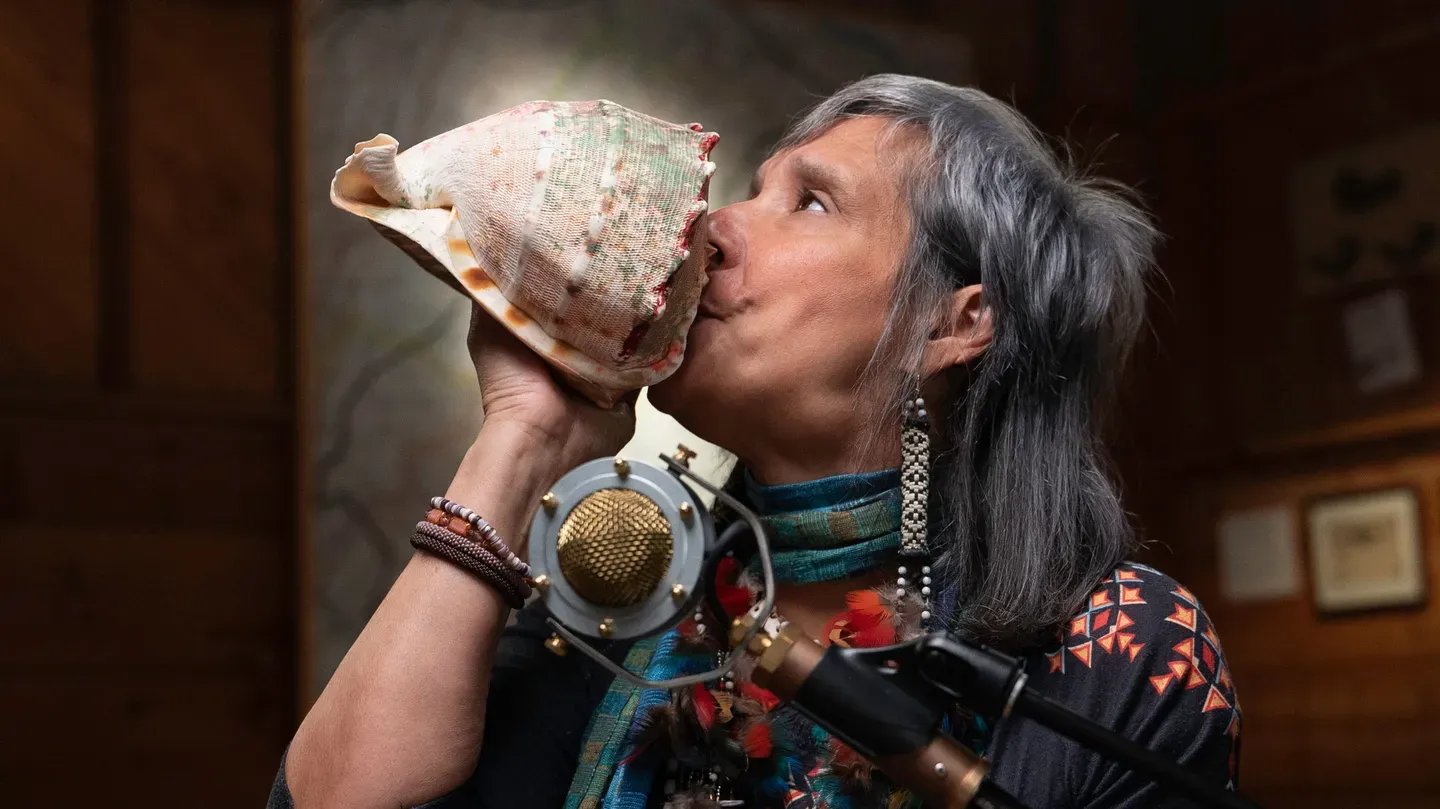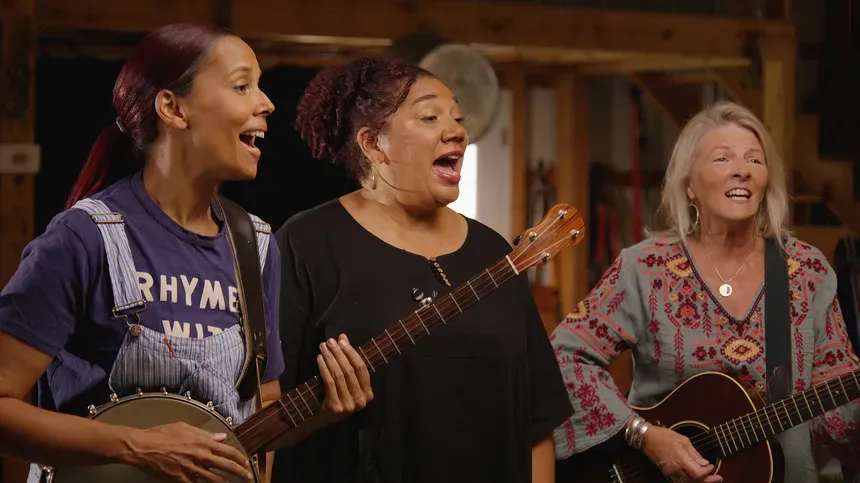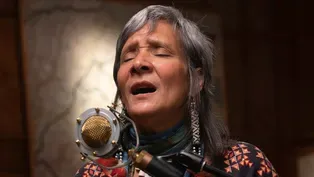

Episode 6
Season 2 Episode 6 | 25m 4sVideo has Closed Captions
Native American vocalist and lap steel guitarist Pura Fé is Rhiannon’s guest artist.
Native American vocalist and lap steel guitarist Pura Fé has both Tuscarora and Taino blood in her veins and generations of ancestors in her voice. She shares her personal background and musical journey in an episode that culminates in a Silkroad Ensemble performance of her song “Mahk Jchi.”

Episode 6
Season 2 Episode 6 | 25m 4sVideo has Closed Captions
Native American vocalist and lap steel guitarist Pura Fé has both Tuscarora and Taino blood in her veins and generations of ancestors in her voice. She shares her personal background and musical journey in an episode that culminates in a Silkroad Ensemble performance of her song “Mahk Jchi.”
How to Watch My Music with Rhiannon Giddens
My Music with Rhiannon Giddens is available to stream on pbs.org and the free PBS App, available on iPhone, Apple TV, Android TV, Android smartphones, Amazon Fire TV, Amazon Fire Tablet, Roku, Samsung Smart TV, and Vizio.
Buy Now

Providing Support for PBS.org
Learn Moreabout PBS online sponsorshipof cultures and traditions of people from all over the world.
In the 19th century, as America was growing, the single thing that brought people into contact with each other like never before was the transcontinental railroad.
I've been working with the amazing musicians of Silk Road Ensemble to shine a light on the laborers, especially Irish, African American, and Chinese, who did the backbreaking work of building America's railroad.
Their traditional music accompanied them as they made their way across the continent.
We also wanted to recognize the indigenous people whose ways of life were forever changed by the laying of tracks through their lands.
The result is our American Railroad project.
The focus in this season of “My Music.
” When Pura Fé opens up her mouth to sing, the ancestors fly out.
Her powerful voice has been an inspiration for a generation of young women in Indian country.
From her deep roots in Puerto Rico and North Carolina to her current home in Saskatchewan Pura Fé's life has been a reclamation of cultural connections.
♪ [Sings in Taino language] ♪ For viewers who are unfamiliar with you and where you come from I'd love to just start with with just the early part of you Well, I was born and raised in New York City and raised with my mom's family who are from North Carolina and — which is how I met you.
And my father is from Puerto Rico, and I wasn't raised with him, but I was raised with a family of singers and my mother and her sisters, and my grandmother and her sisters.
And it goes back sisters through the maternal line.
We count from my generation back, it's nine generations - Wow.
-Of singers, of women singers.
When we follow our maternal line, we're Tuscarora.
The family's from Sampson County, North Carolina.
And so there's a big, rich thing of music from there within my family and just the mixtures of people and all the different types of music and styles and races that just made some very goodlooking people and some really good music.
Being raised with mom in New York, she was an opera singer and some of her sisters were opera singers.
They sang together.
They were called The Monk Sisters.
We're also related to Thelonious Monk from Sampson County back in those days.
So, four of his grandmothers and grandfathers married each other.
And my grandfather came out of one of those.
So there's music, just music in our family.
My mother ended up singing with the Duke Ellington Orchestra for his Sacred Concert series.
My mom went on tour with him with the whole orchestra.
And so I grew up in this church, which was the jazz church in New York City.
The pastor was Pastor Gensel and his services had people like Joe Louis and Miles Davis and all these jazz musicians would come and play.
And he would, once a year, he would have what's called an All Night Soul.
It was like 38 hours straight of nonstop music.
- Aw.
So I would go and I would just go and stay there and never leave.
I would sleep for a couple hours, then wake up and watch, then sleep, and then wake up.
So then also within the house, are you, you guys all singing together?
Yes.
Whenever we would go to grandma and grandpa's house, especially during Christmas time, there was Christmas caroling, and so everybody in the family would sing and it would sound like a, like, [operatically] Wooo!
It was really huge.
And one year we went out on the porch and sang for the neighborhood, and some guy opened up his windows and said, "Shut up!"
Anyway, but yeah, those are things I don't forget.
So, you know, I didn't stay in school.
I left school ‘cause I was dyslexic and had all kinds of challenges that I just didn't feel like going to summer school every year.
-Oh, God.
-So yeah.
So I just finally dropped out, but, and then I ended up being a waitress at Max's Kansas City.
- The place in New York It's really famous, like the Mudd Club, Max's Kansas City and CBGBs.
So I was there during the whole punk era.
I started creating my band.
I had like a band that sounded very grunge before grunge happened.
And then eventually I met my husband, who I grew up with, and we had kids and my mother said I needed to work, so she sent me down to Mercer Ellington And so I started, I worked with the orchestra and we opened for the Duke Ellington School when it was just opening, and Lena Horne was in the second row, and she was yelling at me to go to the other microphone.
And I was so nervous.
My eyelids were fluttering and my voice was like [high-pitched, shakily] "In a Sentimental Mood" [Rhiannon Laughs] ...It was awful.
Anyways, So that was my debut with the Ellington Orchestra.
But because I was part of the Indian community in New York City, I ended up working with Soni, who is a singer, and she sang backup for me in the band I had with James McBride.
And then we got called to sing at a powwow, and I said, I can't bring this whole band to the powwow.
So I asked Soni, I said, Why don't we just take this music down to a drum?
And I said, we'll just sing a capella.
And so that was the beginning of, of the acapella music I started to do.
And then I asked my cousin, who was getting older, Jennifer, so she came and joined us and we then we became Ulali.
Anyway, my grandmother, who I was so close to, she passed away.
And so then I moved back home to North Carolina and that's when I started digging into the music.
And I had asked her, my grandmother, about, because I had learned all this powwow music, and that's not from our territory.
And so I started to ask her, I said like, what, what did the music sound like when you were a kid?
And she really had a hard time describing, but she's, you know... but I did start listening to blues and I had, I put the headphones on her and it was C.C.
Rider.
Oh.
And she goes, “Ooh, you just brought me back!
” So she said they used to sing like that, gospel and blues, her sisters and her, and then later on we found out when she heard our recording of Ulali, when we were singing with hand drums, she says, “That sounds just like what we used to sing, ” she says, “only we were using shakers.
” - Mmmm So that's when we retired the drums a bit and started singing with shakers.
And she said, “and foot stomping.
” And so, then I started creating, I started feeling it and songs were coming to me.
And, and so we kind of connected back to the kind of music that we came from.
[Foot stomping.
Singing in Tuscaroran] ♪ What's so powerful about what you're doing is this idea of look, you know, given the history, there's so much that we have lost, but we didn't lose everything.
- Right.
You know, and then we have elders, you know, like your connection to your grandmother.
So could you just talk a little bit about that reclamation of not only the music, you know, and how you've been... the creative work of, sort of, of reclamation where, you know, it's not exactly, but like —does that matter?
You know what I mean, in terms of how you are, what is left for you to pull from and how do you connect in a way that's authentic and meaningful from a musical standpoint, but also you're an incredible artist, visual, you know, and, and are also doing that in terms of the regalia and what people are wearing.
So just wherever you wanna... - Oh wow.
That's huge... -I know, sorry... That's okay.
No, thank you.
Well, the first thing I'll say is that we are made of memory.
So it's in us, it's in our DNA and sometimes people are born somewhere else and they don't understand why they do what they do the way they do.
And it's because it's in them, their coding.
And, and that I can definitely say that for myself is that's just from a small age I've just been spewing Indian native whatever from both my mother and my father's nations.
So, and it's just like, I even started beading at a very small age.
I could bead and nobody showed me.
And there are songs I've written and don't even have the knowledge of language.
And then I'm writing words out and then later on I find out that those words that I wrote, are exactly what that means.
-Mmm.
-So things like that.
And just being able to be a part of the powwows and meeting lots of native people in the city through the American Indian Community House, which is where I worked for many years.
And in terms of the clothing, you know, of course we all, so many people start off wearing Western.
That just happens, especially if you're part of powwow because the, the dances require that.
But you know, the thing is that people in the West, they have photos.
In the east, we don't, because it was so long ago.
It was before there were photographs.
So you have to kind of think, and then you have to look at these very funny-looking sketches.
And so like, you know, you're seeing the one-arm dress, you know, and then there are shawls - And what pictures you have are by European paintings.
-Right, yeah.
-And so, so... [in aristocratic accent] “I will pull my bow.
” And so, and there's some things that were carried down or spoken about, but not too much.
So you just have to sort of, you just have to wing it.
And I don't think there's anything wrong with that.
You know, you're still the people and you're creating what you create and it's part of the, part of your people and it's for your people.
-So there's people who, you know, occupy a space where they end up, whether they want to or not being mentors, ambassadors, you know, cultural focal points.
And I think you qualify for all of those.
We had recently, on the last season, we had Charly Lowry also in North Carolina, and she cites you as, you know, a pretty powerful and important mentor in her life.
When we first went to North Carolina, we wanted to be fed... Me and my cousins, we wanted to be fed all this stuff and it wasn't there.
And so what was there, was a nice strong powwow culture, but there wasn't that other, like our real songs and our stomp dances and all that.
I was dragged into the Seventh Generation youth group in Robeson County.
And they had culture classes for these kids.
They were great.
There was two that stood out.
One was Dave Locklear and Charly Lowry.
And the two of them were just outstanding vocalists and just really talented and they sounded like ancestors when they sang.
Yeah.
Charly is my girl.
I'm very proud of her.
She sounds better than ever.
-Yes.
-Yeah.
Yeah.
What you do is exactly what everybody else in Silkroad does, which is you're pulling from tradition, but then you have this incredibly creative and curious mind and you apply it to the tradition and are open to, you know, where that intersects with other traditions.
Talk a little bit about the “all-play ” that you that you brought to, to Silkroad, the song that everybody plays on and, and where that, where that's coming from.
The song “Mahk Jchi ”, which means "Our Hearts," it's in the Occoneechee, Tutelo, Saponi language You are partially Occoneechee.
That song started a really long time ago, and then eventually it became a song that we needed to create for Robbie Robertson's Red Road Ensemble.
“Hearts are full, our minds are good.
“Our ancestors come and they give us strength.
“They say stand tall, sing and dance, “and never forget who you are or where you come from.
” But I think about, you know, that's like where we come from back home.
There were all these cross-cultures and they created a sound.
Right.
So this is the same.
♪ - The roots run deep, The soul Mother Earth protecting people, their sacred birth, Not who's first, but where you belong.
Where many old spirits dance your song.
Piece of paper and Devil's eye, For this, you let my people die To return our land, our lullabies Though the earth, the sky will pay the price Through the earth, the sky, our soul will rise.
Wo-o-o Wo-o-o [Sings In Occoneechee, Tutelo, Saponi]
Video has Closed Captions
Native American vocalist and lap steel guitarist Pura Fé is Rhiannon’s guest artist. (30s)
Providing Support for PBS.org
Learn Moreabout PBS online sponsorship











